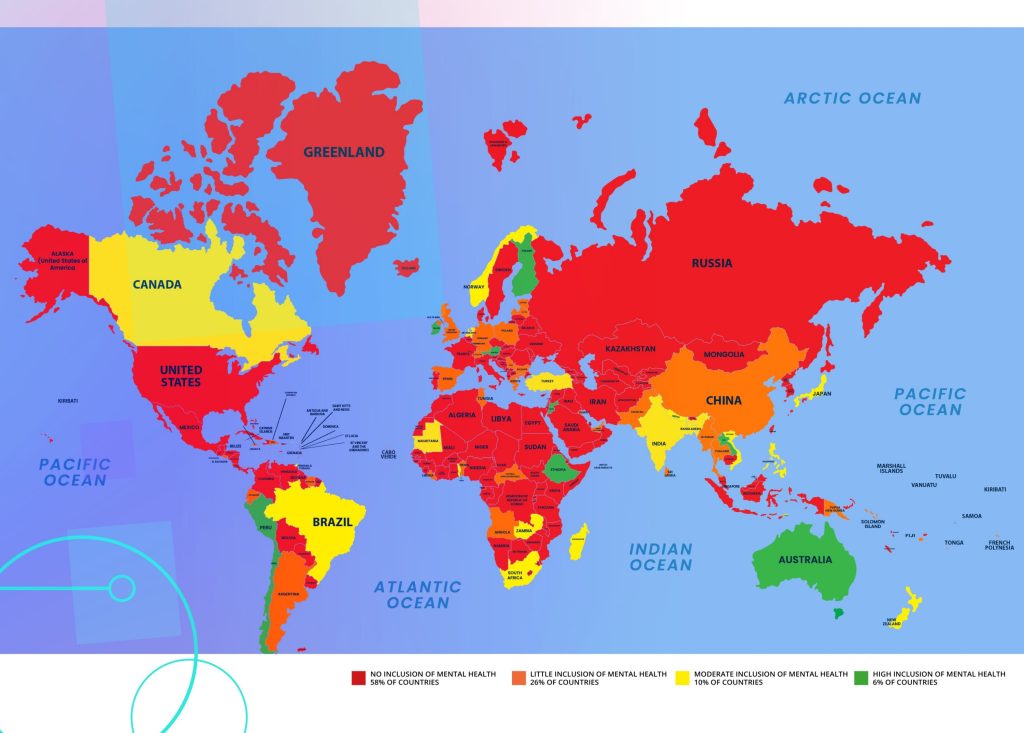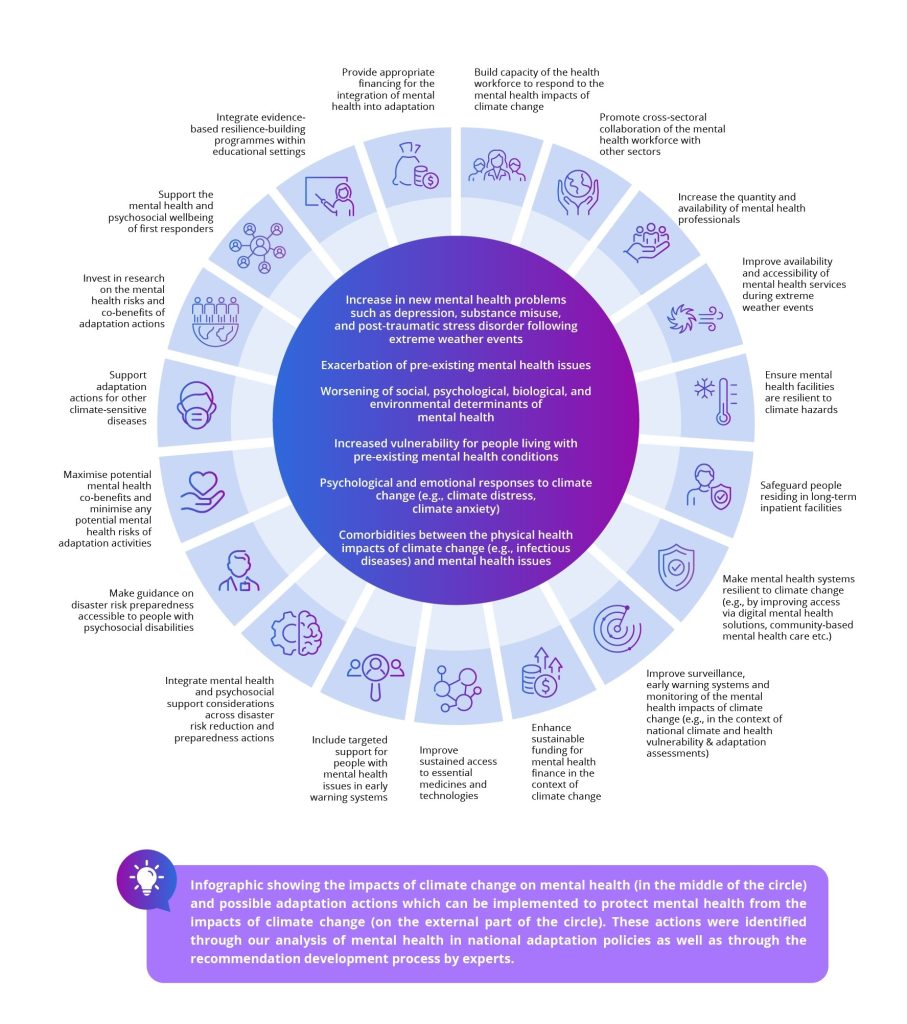Launch of a joint United for Global Mental Health & Climate Cares Centre report on mental health in national adaptation policies. This blog post was written by Alessandro Massazza, United for Global Mental Health, and Jessica Newberry Le Vay, Climate Cares Centre.

From increasing the risk of new mental health problems following extreme weather events to making people living with pre-existing mental health problems more vulnerable, climate change affects all aspects of people’s mental health and wellbeing. The latest report by the Intergovernmental Panel on Climate Change (IPCC) indicates, with high confidence, that climate change has already been negatively impacting mental health globally, and that these impacts are expected to worsen as climate change deepens.
A number of actions can be taken to protect people and communities from the impacts of already happening climate change. These actions are collectively known as “adaptation” actions, which can be defined as the human process of adjusting to the actual or expected climate and its impacts in order to reduce harm or to benefit from opportunities. Adaptation activities can include things like building flood defences, setting up and implementing early warning systems for extreme weather events such as cyclones, or switching to drought-resistant crops. Importantly, adaptation is needed to protect mental health from climate change-related hazards, and the actions can also have significant co-benefits (i.e. additional wins) for mental health, for example the potential additional mental health benefits of increasing tree cover and green space access in cities beyond the cooling effect.
And yet, mental health often receives insufficient attention in the context of climate adaptation discussions. For example, according to a 2025 World Health Organisation review of health in national adaptation plans (59 national adaptation plans (NAPs) and 27 health national adaptation plans (HNAPs)), mental health and psychosocial considerations are included in less than half of NAPs (44%) and remain incompletely documented across HNAPs (81%). Importantly, only 5% of NAPs and 22% of HNAPs included specific actions to address mental health and psychosocial needs, making mental health one of the health outcomes with the least actionable recommendations in the context of adaptation policies. Another recent review on children’s health in NAPs found that of the 160 countries it examined, none included considerations on children’s mental health. An analysis of HNAPS in South America also highlighted the minimal recognition of mental health. The lack of recognition of mental health in adaptation policies may also be driven by the dearth of robust research on the mental health impacts of adaptation action.
To address this gap, United for Global Mental Health and the Climate Cares Centre at Imperial College London joined forces to develop a report that: 1) reviews the current state of mental health integration in adaptation planning, and 2) provides evidence-based recommendations and content suggestions on how policymakers working on national adaptation plans can integrate mental health in their policies. The report is launching this week in the context of the 2025 Global Climate and Health Conference in Brasilia, Brazil. It represents a call to ensure mental health is meaningfully integrated in adaptation action at the national level and across international commitments such as the Belém Health Action Plan for the Adaptation of the Health Sector to Climate Change. You can access the full report here.
The report reviewed national adaptation policies from 193 countries and the main findings were:
Overall, mental health was not included in the majority of national adaptation policies (58%) and, when included, it was often mentioned superficially and/or with no corresponding adaptation action. The heat map below highlights the degree of inclusion of mental health in national adaptation policies globally.

The report also provides concrete evidence-based recommendations and suggested content for the integration of mental health into national adaptation policies. The recommendations include:
- Recognise the diverse negative impacts of climate change on mental health, including the increased risks certain groups with specific vulnerabilities may face
- Monitor the mental health impacts of climate change and any mental health risks and co-benefits of adaptation at a national level to ensure appropriate and effective adaptation responses
- Ensure specific adaptation actions are planned and implemented to protect and promote good mental health, as well as to prevent and manage mental health problems (see infographic below for possible actions)
- Identify the many co-benefits to mental health that appropriate adaptation measures and actions can have
- Ensure appropriate financing is available for the integration of mental health into adaptation efforts
- Recognise that many places may be unable to fully adapt to climate change, resulting in significant losses and damages among people and communities. Therefore, appropriate mental health and psychosocial support needs to be resourced and provided to affected populations immediately
- Build collaborative, cross-sector partnerships – including with communities – that combine diverse forms of expertise to inform the design, delivery and evaluation of efforts to integrate mental health into adaptation.

Throughout the report, we highlight case studies of best practices for the integration of mental health into national adaptation plans including case studies from Ethiopia, Bangladesh, Canada, Jordan, Australia, Finland, and Chile.
Mental health must be centered in adaptation action, both to protect the mental health of people and communities from the worst impacts of climate change but also because healthy people and communities are needed for sustained adaptation to climate change. As countries prepare for enhancing progress on adaptation at COP30 in Belém, Brazil, the current report provides a roadmap on how to do this, to ensure everyone can experience the highest attainable standard of mental health, even in the context of a changing climate.
Read the full report: Integrating Mental Health into Climate Change Adaptation Policies
Find out more about the Climate Cares Centre